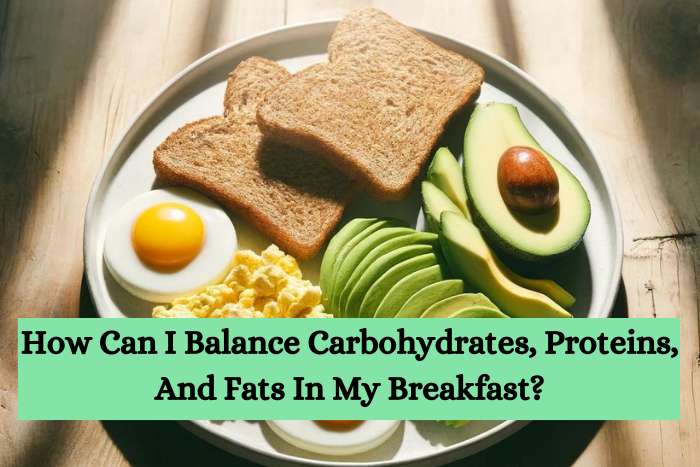- Importance of Macronutrients: Breakfast is crucial as it fuels the body for the day, with each macronutrient serving a specific function: carbohydrates for energy, proteins for tissue repair and growth, and fats for cell growth and hormone production. For example, a balance of these nutrients can prevent mid-morning energy crashes, akin to how a car runs smoothly with the right mix of fuel, oil, and coolant.
- Balanced Diet Principles: Achieving the right balance in breakfast involves understanding the proportions of macronutrients (45-65% carbohydrates, 10-35% protein, 20-35% fats) rather than merely selecting “healthy” foods. This concept is similar to managing a well-balanced budget where spending is spread across essentials, savings, and leisure to ensure overall financial health.
- Practical Application of Nutrient Balance: Crafting a breakfast plate with a balance of macronutrients means choosing complex carbs like whole grains, quality proteins like eggs or Greek yogurt, and healthy fats like avocados. It’s like assembling a team with different skills: each player contributes uniquely to the team’s success.
- Customizing to Dietary Needs: Breakfast should be adapted to individual dietary requirements and lifestyles, much like how a workout routine is tailored to fit one’s specific fitness goals, ensuring that the nutrients consumed support personal health needs effectively.
- Impact of a Balanced Breakfast on Daily Performance: A balanced breakfast not only satisfies hunger but also improves cognitive function and energy levels, setting a positive tone for the entire day. This is akin to starting the day with a fully charged phone battery, ensuring it lasts through the day without needing a recharge before evening.
Breakfast often gets touted as the most important meal of the day, and it’s for good reason. It’s my morning fuel, and probably yours too.
Getting the right balance of carbohydrates, proteins, and fats can make all the difference in how I feel and perform throughout the day. Each of these macronutrients plays a unique role in nutrition.
Carbohydrates are my energy source, while proteins are essential for repairing and building tissues, and fats are vital for supporting cell growth and producing essential hormones. So, what’s the secret to getting this balance right?
🌞 The Bright Side of Breakfast 🌞 |
|
|---|---|
| Boosts Energy Levels | Starting your day with a nutritious breakfast provides the energy needed to perform daily tasks efficiently. |
| Improves Metabolism | Eating breakfast kick-starts your metabolism, helping you burn calories throughout the day. |
| Enhances Cognitive Function | A balanced morning meal can improve memory, concentration, and mood. |
| Promotes Healthy Eating Habits | Regularly consuming a healthy breakfast can reduce cravings and overeating later in the day. |
| Supports Long-term Health | Studies show that a consistent, nutritious breakfast is linked to a lower risk of various health issues, including heart disease and diabetes. |
| Brought to You by athomewithtai.com | |
It’s not just about choosing ‘healthy’ foods, but rather understanding the proportions and how they interact to support bodily functions. For instance, dietary guidelines recommend that an adult’s calorie intake should consist of 45-65% carbohydrates, 10-35% protein, and 20-35% fats.
The trick is to turn these percentages into actual food on my plate. This isn’t about meticulous calorie counting every morning but gaining a practical grasp of these macronutrient ratios.
A good approach is to think about creating a balanced plate that can keep me full until lunch, fuel my morning tasks, and maintain optimal health. A balanced breakfast has the power to set the tone for my entire day.
It’s not just about satiating hunger; it’s about providing the body with the nutrients it needs to thrive. I’ve noticed that when I get the balance right, I’m more focused, energetic, and less likely to experience mid-morning crashes or cravings.
So what’s next? Understanding how to apply this macro blueprint to real food.
In the following section, I’ll share precisely how to craft a breakfast that fits these nutritional goals with practical recipes and tips. Stick with me, and let’s turn that blueprint into a delicious daily reality.
Crafting Your Perfect Breakfast Plate: Practical Tips and Ideas

You know the role each macronutrient plays by now. What you need is a strategy to balance these components on your morning plate.
It’s easier than you might think—it’s about making informed choices and developing simple habits. When it comes to carbohydrates, the aim is to choose complex carbs like whole grains, which release energy gradually.
Think oatmeal, quinoa, or whole-grain toast. Combine these with high-quality proteins such as eggs, Greek yogurt, or a handful of nuts to maintain muscle health and keep you feeling full longer.
Fats are crucial, too, but quality matters immensely. Opt for unsaturated fats found in foods like avocados, seeds, and nuts, which contribute to heart health.
Balancing your plate with a mix of these fats can provide sustained energy and help with nutrient absorption. Don’t forget; that there’s no one-size-fits-all.
For example, if you’re gluten intolerant, switch out the toast for gluten-free options. If you lead a vegetarian lifestyle, there are excellent plant-based proteins like lentils and chickpeas.
Adapt your plate to suit your unique dietary needs and preferences. A balanced breakfast doesn’t have to be time-consuming.
Of course, you can always grab a breakfast bar!
If you’re pressed for time, a smoothie with fruits, leafy greens, a scoop of protein powder, and a spoon of nut butter can offer the right balance in a grab-and-go format. Finally, whole foods are your friends.
Processed foods often sneak in added sugars, unhealthy fats, and excess sodium—disrupting your macronutrient balance and potentially impacting your health goals. Aim to prepare a breakfast that is as close to its natural state as possible for maximum benefit.
The Science of Satiety: How Balanced Breakfasts Can Improve Your Day

Understanding how macronutrients impact your hunger and fullness cues is crucial. It’s not just about what you eat, but how those foods make you feel throughout the morning.
When you balance carbohydrates, proteins, and fats, you equip your body with the tools it needs to release energy slowly and steadily. This balanced release prevents the spikes and crashes in blood sugar that can leave you feeling sluggish or famished before lunchtime.
Beyond just quelling hunger, the right mix of nutrients profoundly affects brain function. A breakfast rich in quality protein helps in the production of neurotransmitters, the chemicals that transmit signals between nerve cells.
These neurotransmitters play a significant role in regulating mood and cognitive abilities, narrowing the gap between a productive day and one spent battling brain fog. Approaching your morning meal with balance also sets a precedent for the rest of your day.
Regularly starting your day with a breakfast that aligns with macronutrient recommendations can lead to sustained weight management and better overall health. When you’re mindful of this balance, you’re more likely to make healthier choices at subsequent meals.
Consider how individuals who have focused on balanced breakfasts report feeling. Many share that they experience fewer cravings, maintain focus easier and generally feel more robust in their everyday activities.
My Final Thoughts
That’s the power of breakfast working for you, not just in the immediate hours following it, but as a foundational component of a healthy lifestyle. Incorporating balance in your breakfast is more than a meal choice; it’s a commitment to nurturing your body and setting yourself up for success.
Whether it’s a busy workday, an intense workout, or simply a relaxed weekend morning, starting with the right nutrients in your system can make all the difference. Remember, a well-balanced breakfast is your stepping stone to a vibrant and productive day.
How has your experience with balancing macronutrients in your breakfast impacted your daily energy levels and overall health, and what adjustments have you found most beneficial? Let me know in the comments below!
FAQ: Balanced Breakfast and Macronutrients

1. Why is breakfast considered the most important meal of the day?
- Breakfast provides the necessary fuel after an overnight fast, kickstarting the metabolism and energy levels for the day ahead.
- Eating a balanced breakfast has been linked to improved cognitive function, better weight management, and decreased risk of chronic diseases.
2. What are macronutrients and why are they important?
- Macronutrients are nutrients that provide energy to the body, including carbohydrates, proteins, and fats.
- They are essential for different bodily functions: carbohydrates are the primary energy source, proteins are crucial for growth and repair, and fats support cell growth and hormone production.
3. How can I balance macronutrients in my breakfast?
- Aim to include a variety of foods that offer a mix of carbohydrates, proteins, and fats, following the recommended dietary guidelines of 45-65% carbohydrates, 10-35% protein, and 20-35% fats.
- Focus on whole foods like whole grains, lean proteins, and healthy fats to ensure a slow and steady release of energy throughout the morning.
4. What are some examples of a balanced breakfast?
- A bowl of oatmeal with nuts and berries, alongside a serving of Greek yogurt for a mix of complex carbs, protein, and healthy fats.
- Whole-grain toast with avocado and poached eggs offers a good balance of carbohydrates, fats, and proteins.
5. How does a balanced breakfast affect health and daily performance?
- A balanced breakfast can improve mental clarity, stabilize blood sugar levels, and sustain energy levels throughout the day, reducing the likelihood of mid-morning slumps or cravings.
- Regular consumption of a nutritious breakfast is associated with long-term health benefits, including better weight management and a lower risk of developing chronic diseases like diabetes and heart disease.
- Air Fryers: The Healthy, Quick, and Easy Cooking Solution
- Beginner’s Delight: Explore Global Cuisine
- Are Organic Ingredients Changing Fast Food Forever?
- Can Burgers Be Part of a Healthy Diet?
- Why Are Breakfast Juices a Smart Choice?
- What’s the Best Beverage for Diabetics at Breakfast?

I’m Diane, a culinary enthusiast who loves to share my cooking adventures and knowledge with you.
This blog is my cozy corner on the internet where I unravel the secrets behind making everyday cooking simple, enjoyable, and downright delicious.
Whether it’s unlocking the flavor potential in chicken or figuring out why your mashed potato cakes won’t hold together, I’m here to guide you through.
Join me as we explore various dishes, solve common kitchen dilemmas, and discover new recipes that will make you fall in love with cooking all over again.
Cooking is an adventure that’s best shared, so let’s get started!







